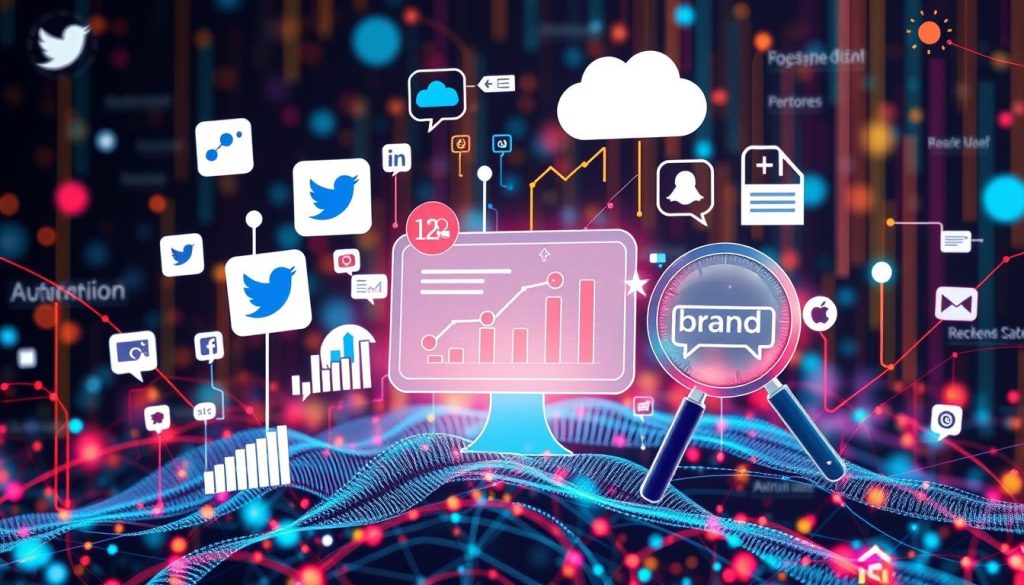Businesses need robust tools to keep up with fast-paced online conversations. Social listening tools help organizations monitor, analyze, and respond to brand chatter. These platforms offer valuable insights for informed decisions and better audience connections.
Social listening tools empower brands to enhance their online reputation. They provide a way to track and analyze relevant conversations about products and industries. This knowledge can unlock many opportunities for your brand.
Key Takeaways
- Social listening tools are essential for monitoring online conversations, brand mentions, and industry trends.
- These platforms provide valuable insights into customer sentiment, feedback, and audience behavior.
- Leveraging social listening data can help brands improve their marketing strategies, enhance customer service, and stay ahead of the competition.
- Effective social listening requires setting up targeted monitoring queries and alerts to capture relevant discussions.
- Integrating social listening into your overall marketing and business intelligence efforts can lead to more informed decision-making.
Introduction to Social Listening Tools
Social media monitoring tools are crucial for businesses in today’s digital world. These powerful solutions track online discussions across platforms. They provide insights into brand reputation, customer sentiment, and industry trends.
Social listening platforms help companies stay informed about their online perception. They enable businesses to identify trends and respond to feedback quickly.
Understanding the Importance of Social Media Monitoring
Social media monitoring is vital for maintaining a positive brand image. Companies can track conversations on Twitter, Facebook, and Instagram. This proactive approach allows for swift responses to customer feedback.
Businesses can address potential issues before they grow. Online reputation management is crucial in our digital age.
Key Benefits of Utilizing Social Listening Platforms
- Improved brand reputation and visibility
- Enhanced customer engagement and satisfaction
- Data-driven decision-making for marketing and product strategies
- Early detection of industry trends and competitive insights
- Efficient customer service and crisis management
Social media monitoring tools offer deep insights into target audiences. They allow businesses to track brand mentions and respond to customers quickly.
This approach to social listening helps companies make smart decisions. It strengthens customer relationships and boosts competitiveness.
“Social listening is the process of monitoring digital conversations to understand what customers are saying about a brand and industry.” – Hootsuite
What Are Social Listening Tools?
Social listening tools are powerful software applications. They monitor and analyze online conversations about brands and industries. These tools provide insights from various digital channels.
These platforms scour the internet for relevant mentions and discussions. They collect data from social media, blogs, forums, and news sites. This information helps businesses understand consumer sentiment and emerging trends.
Social listening tools offer valuable competitive intelligence. They use advanced algorithms and natural language processing. These features help businesses make data-driven decisions.
- Identify and track brand mentions, product discussions, and industry-related conversations across the web
- Analyze sentiment, emotions, and opinions expressed in online interactions
- Uncover emerging trends, consumer insights, and competitive intelligence
- Generate actionable data to inform marketing strategies, product development, and customer engagement
These tools empower businesses to enhance their marketing efforts. They improve customer experience strategies. Organizations can stay ahead of market shifts and address new challenges.
“Social listening is the practice of monitoring digital conversations to understand what customers are saying about a brand and industry.”
By using social listening tools, companies can anticipate changes in consumer behavior. They can proactively address emerging opportunities. This approach helps organizations thrive in their markets.
Top Social Listening Platforms
Hootsuite Insights and Sprout Social lead the social media monitoring industry. These social media monitoring tools track conversations, analyze sentiment, and provide insights into online brand presence.
Hootsuite Insights
Hootsuite Insights is a powerful brand monitoring solution using machine learning and natural language processing. It offers real-time insights into social media brand performance.
Its sentiment analysis software categorizes positive, negative, and neutral sentiment. This allows quick response to customer concerns and capitalization on positive mentions.
Sprout Social
Sprout Social offers a user-friendly platform with advanced analytics capabilities. It provides audience demographics, content performance, and competitive benchmarking.
The platform’s social listening tools monitor brand mentions and track industry trends. It enables team collaboration for targeted social media strategies.
| Feature | Hootsuite Insights | Sprout Social |
|---|---|---|
| Real-time monitoring | ✓ | ✓ |
| Sentiment analysis | ✓ | ✓ |
| Audience insights | ✓ | ✓ |
| Competitive analysis | ✓ | ✓ |
| Team collaboration | ✓ | ✓ |
Hootsuite Insights and Sprout Social offer robust social listening tools for monitoring online presence. They help track industry trends and guide data-driven marketing decisions.
These powerful platforms help organizations manage their brand reputation effectively. They allow businesses to stay ahead in the ever-changing digital landscape.
Monitoring Brand Mentions and Online Reputation
Managing a brand’s online reputation is crucial in today’s digital world. Social listening tools help businesses track brand mentions across social intelligence platforms. These brand monitoring solutions allow companies to gauge perception and address issues promptly.
Social listening platforms offer valuable insights into brand conversations. They track mentions on various online channels, identifying positive and negative sentiments. This data helps inform decisions, improve customer relations, and protect brand image.
- Comprehensive monitoring of brand mentions across social media, forums, and news sources
- Sentiment analysis to understand the tone and sentiment behind brand mentions
- Real-time alerts to quickly respond to emerging issues or trends
- Competitive analysis to benchmark brand performance against industry peers
- Reputation management strategies to address negative feedback and enhance positive brand perception
Online reputation management tools empower businesses to monitor their digital presence actively. They help identify potential issues and strengthen overall brand reputation. These tools are essential for maintaining a positive online image.

“Effective social listening can be the difference between a brand thriving or languishing in the digital landscape.” – Marketing Analyst, XYZ Consulting
Sentiment Analysis and Customer Feedback
Social media has made customer sentiment crucial for businesses. Advanced sentiment analysis software in social listening tools can revolutionize marketing strategies. These tools help improve products and services based on customer feedback.
Identifying Positive and Negative Sentiment
These platforms analyze emotions and opinions across social media channels. They categorize feedback as positive, negative, or neutral. Customer feedback analysis provides valuable insights into brand perception.
Businesses can respond to customer sentiments effectively. They can identify trends in feedback and make informed decisions. Companies can address the root causes of customer dissatisfaction proactively.
- Identify trends in customer sentiment, such as spikes in positive or negative feedback, to make informed decisions.
- Understand the root causes of customer dissatisfaction and address them proactively.
- Amplify and celebrate positive customer experiences, fostering brand loyalty and advocacy.
Social data analytics helps businesses stay agile and responsive. It keeps them in tune with their audience’s evolving needs. This data-driven approach enhances products and services.
Companies can streamline operations and deliver superior customer experiences. By focusing on customer feedback, businesses can build stronger relationships with their target audience.
“Sentiment analysis is a game-changer in the world of social listening, unlocking invaluable insights that can transform a business’s relationship with its customers.”
Tracking Conversations and Industry Trends
Social listening tools are crucial for businesses aiming to stay competitive. These conversation tracking tools and social intelligence platforms monitor online discussions and identify industry trends. They provide valuable audience insights from social media, forums, and other digital platforms.
Social listening helps track real-time discussions and pinpoint hot-button industry issues. This data informs strategic decisions, product development, and marketing initiatives. Companies can address customer needs proactively, becoming thought leaders and problem-solvers.
| Feature | Benefit |
|---|---|
| Conversation tracking | Monitor online discussions to stay informed about industry topics and emerging trends |
| Trend analysis | Identify and analyze the most relevant and influential trends, enabling more informed business decisions |
| Competitor benchmarking | Understand how your brand compares to industry peers and uncover areas for improvement |
Social intelligence platforms and audience insights platforms offer deep industry knowledge. They help businesses understand their competitors and target customers better. This information refines marketing strategies and enhances product offerings.
Companies can use these insights to drive long-term success. They adapt to market changes and meet evolving customer needs effectively.
Audience Insights and Social Data Analytics
Social listening platforms offer more than just tracking brand mentions. They provide valuable audience insights and data analytics capabilities. These tools can significantly improve business decision-making and drive growth.
Organizations can gain a deeper understanding of their target audience using these platforms. They can uncover meaningful customer feedback and make data-driven decisions. This approach helps businesses stay aligned with their customers’ needs.
Understanding Your Target Audience
Social listening reveals demographics, interests, and behaviors of your target audience. It analyzes conversations, content engagements, and social media activity. These social data analytics tools show who your customers are and what they care about.
Audience intelligence can inform product development and marketing strategies. It ensures your business stays aligned with key stakeholders’ needs and preferences. This data helps create more effective and targeted business approaches.
Leveraging Social Data for Better Decisions
Customer feedback analysis data from social listening can be a game-changer for businesses. It identifies patterns, trends, and sentiment within online conversations. This information helps organizations make more informed decisions across various operations.
Social data analytics empower businesses to develop strategies based on real-time insights. These insights can enhance customer experiences and optimize marketing campaigns. They replace assumptions with actionable data, leading to more effective business strategies.
| Key Benefits of Social Listening | Actionable Insights |
|---|---|
|
|
Audience insights platforms and social data analytics offer businesses a comprehensive view of their target audience. This knowledge enables better-informed decisions. Ultimately, it drives growth and success for organizations that leverage these powerful tools.
Integrating Social Listening with Marketing Strategies
Social media monitoring tools, brand monitoring solutions, and social intelligence platforms are vital for modern businesses. These tools help companies understand their audience better. They also refine content creation and boost customer engagement on social media.
Social listening offers valuable customer feedback and sentiment analysis. It helps businesses identify customer issues and needs. Companies can then tailor their messaging to address these concerns effectively.
This approach also provides insights into industry trends and competitive benchmarking. By watching competitors online, businesses can understand the market better. They can spot new trends and adjust their strategies accordingly.
| Key Benefits of Integrating Social Listening with Marketing Strategies |
|---|
|
Integrating these tools into marketing strategies unlocks powerful insights. This data-driven approach leads to more effective campaigns. It boosts customer engagement and brand loyalty, giving businesses a competitive edge.
Social Intelligence for Competitive Analysis
Social intelligence platforms offer valuable insights for businesses. These tools help you monitor competitors and analyze their marketing strategies. By using brand monitoring solutions, you can gain a competitive edge.
Monitoring Competitor Activity and Benchmarking
Social listening tools track mentions of your competitors across various online channels. You can stay informed about their product launches, marketing campaigns, and customer sentiment. This allows you to benchmark your performance and identify areas for improvement.
Social intelligence platforms reveal your competitors’ strengths and weaknesses. You can learn about their target audience and overall positioning. This information helps refine your marketing strategies and product development.
Use these insights to improve your customer service initiatives. Stay ahead of the curve and outperform your competition with data-driven decisions.
- Leverage social intelligence platforms to monitor competitor activity and online mentions
- Analyze your competitors’ marketing strategies, product launches, and customer feedback
- Benchmark your brand’s performance against industry leaders to identify areas for improvement
- Use competitive insights to inform your own marketing and business decisions
Social intelligence gives you a strategic advantage in the marketplace. It positions your brand as an industry leader. Unlock the full potential of your social media monitoring efforts.
Customer Service and Social Listening
Social listening is a powerful tool for businesses to boost customer service. It helps companies quickly spot and address customer issues on social media. This approach improves satisfaction and strengthens brand loyalty.
Integrating social listening with customer service keeps businesses ahead. These tools offer insights into customer feelings and needs. Companies can quickly fix problems and improve their services.
Customer feedback analysis helps uncover pain points and areas for improvement. Businesses can then tailor their services to better meet customer needs.
Social listening helps companies leverage social data analytics for deeper customer understanding. By analyzing online conversations, businesses gain valuable audience insights. This data-driven approach allows for personalized support and stronger customer relationships.
| Benefits of Integrating Social Listening into Customer Service | Key Features of Social Listening Platforms |
|---|---|
|
|
Social listening helps businesses stay connected with their audience. It allows companies to anticipate needs and deliver exceptional experiences. This approach fosters lasting relationships with customers.
“Social listening is not just about monitoring brand mentions – it’s about understanding the pulse of your customers and using that knowledge to drive better business decisions.”
Best Practices for Effective Social Listening
Social media monitoring tools are vital for businesses. They help track conversations and customer feedback. Companies can stay informed about trends and brand mentions using these tools.
Comprehensive monitoring queries and alerts are essential. They enable businesses to analyze customer sentiment effectively. This information helps companies respond quickly to market changes.
Setting Up Monitoring Queries and Alerts
Start by creating a solid set of monitoring queries. Identify key keywords, hashtags, and brand names to track. Cover a wide range of topics across various social platforms.
Include industry discussions and customer service inquiries. Don’t forget brand-related conversations. This broad approach ensures you capture all relevant information.
- Create comprehensive keyword lists that encompass your products, services, industry, and competitors.
- Set up alerts to notify you of any significant changes or spikes in mentions, sentiment, or emerging trends.
- Regularly review and refine your monitoring queries to keep pace with the evolving social media landscape.
Consistent monitoring helps businesses respond swiftly to customer needs. It allows them to address potential issues promptly. Companies can use these insights to improve their strategies.
These strategies include social media monitoring tools, brand monitoring solutions, and customer feedback analysis. By refining these tools, businesses can stay ahead in the market.
| Social Listening Best Practices | Benefits |
|---|---|
| Comprehensive Monitoring Queries | Stay informed about relevant conversations and customer feedback |
| Automated Alerts and Notifications | Quickly identify and respond to emerging trends or potential issues |
| Continuous Query Refinement | Adapt to the evolving social media landscape and changing customer needs |
“Effective social listening is not just about monitoring mentions, but about uncovering insights that can drive real business impact.”
Social Listening Tools for Different Industries
Social listening platforms address unique industry needs. They offer valuable insights into target audiences and trends. These tools help organizations make informed strategic decisions.
In retail, audience insights platforms monitor brand mentions and track customer sentiment. They identify emerging trends to optimize marketing campaigns. This data improves product offerings and enhances customer experiences.
Healthcare organizations use these tools to monitor discussions about medical conditions and treatments. They also track patient experiences. This helps develop better patient education materials and improve customer service.
Finance and banking institutions use social listening to stay ahead of industry developments. They monitor regulatory changes and gauge public sentiment towards their brand. This allows them to address customer concerns proactively.
| Industry | Social Listening Application | Key Benefits |
|---|---|---|
| Retail | Brand monitoring, customer sentiment analysis, trend identification | Optimized marketing campaigns, improved product offerings, enhanced customer experience |
| Healthcare | Monitoring discussions around medical conditions, treatments, and patient experiences | Improved patient education materials, better customer service, identification of potential safety concerns |
| Finance and Banking | Monitoring industry developments, regulatory changes, and public sentiment | Proactive customer service, improved brand reputation |
Social listening tools empower businesses to stay informed and make data-driven decisions. They help organizations better serve their customers across various industries. By tailoring these platforms, companies can unlock the full potential of social intelligence.

Challenges and Limitations of Social Listening
Social media monitoring tools have transformed how businesses understand their audience. However, these platforms face challenges and limitations. Data privacy is a major concern. Collecting user-generated content raises ethical and regulatory questions.
Interpreting sentiment from online conversations is complex. Language is often nuanced and context-dependent. Specialized expertise is needed to analyze insights from social listening tools. This ensures businesses can make informed decisions based on reliable data.
Social listening data may not represent the broader consumer base. This can lead to bias or skewed insights. Businesses must be careful when interpreting social media data. It’s crucial to use other research methods for a complete picture.
| Challenge | Description |
|---|---|
| Data Privacy Concerns | The collection and analysis of user-generated content can raise ethical and regulatory issues regarding data privacy. |
| Sentiment Analysis Complexity | Accurately interpreting sentiment from online conversations requires specialized expertise, as language is often nuanced and context-dependent. |
| Potential for Bias | The insights gathered through social listening may not be representative of the broader consumer base, leading to biased decision-making. |
To tackle these issues, businesses should create clear data privacy policies. They should train their teams on effective social listening strategies. It’s important to use other research methods alongside social media data.
By addressing these limitations, companies can harness the power of social listening tools. This leads to more informed and impactful decisions.
Conclusion
Social listening tools are crucial for businesses in the digital world. They offer valuable insights, helping companies track brand mentions and monitor online sentiment. These platforms gather audience data and shape marketing strategies effectively.
Social media monitoring tools help businesses manage their online reputation. They reveal industry trends and provide a deeper understanding of target audiences. Companies can use customer feedback to improve products and deliver exceptional experiences.
The benefits of social listening tools are game-changing for businesses of all sizes. They give companies a competitive edge and set them up for long-term success. Explore the top social media monitoring tools to harness the power of social intelligence today.




